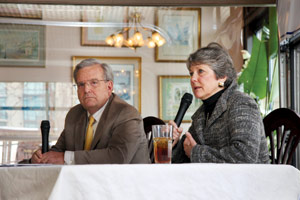Incumbent North Carolina state Rep. Bruce Goforth sparred with challenger Patsy Keever last week at a luncheon hosted by the Council of Independent Business Owners — facing off over their differing views on topics such as the Sullivan Acts, taxes and steep-slope development.

Keever, a former Buncombe County commissioner, schoolteacher and longtime political activist, emphasized several times at the March 4 event that she wasn't running to oppose Goforth (she praised some of his achievements) but "to give the people in our district a choice of representation … there are many things out there that the people have not been represented on."
Goforth, who's risen over his four terms to become a Democratic whip (one of five) and a vice chairman (one of 18) of the powerful Appropriations committee and chair of the capital allocation subcommittee, touted his legislative experience, asserting that he's a dedicated representative whose aim is "to continue to help Western North Carolina get its fair share." Goforth represents the 115th District, encompassing roughly the southeastern quarter of the county, including much of Asheville.
In their opening statements, Keever said she was basing her campaign around the "four Es" — economy, education, environment and equality. On that last measure, she praised Asheville City Council's recent move forward on domestic-partner benefits. Goforth emphasized that "I've been there eight years. I've missed six days. I voted 99.6 percent of the time. I've always been there and always voted. When you look at what we're going through, experience counts down there."
The two differed over a number of local issues. Goforth was an architect of the Sullivan Acts, state laws that uniquely prohibit Asheville from charging differential water rates or using water extensions as a tool in annexing surrounding areas. The rules have come under harsh criticism from city politicians, who assert they hamstring the city's growth and budget. But Goforth defended those laws, asserting that "this thing has been through the court three times. The county deserves the same rate. They were part of the building of the water system."
"The Sullivan Acts have been extremely kind to the county," Keever replied. "It's very different in every other county in the state, and I don't see why Buncombe County should continue to be that different. I'd like to take a look at it again."
Keever also strongly endorsed raising the hotel-occupancy tax, noting, "It seems like we have a low hotel tax in this community, and it seems like we could benefit greatly from a little higher tax." Goforth countered that some surrounding counties have lower hotel taxes. He remarked that he was "extremely concerned" about what might happen if "we increase our rates and people start stopping in Burke County and Henderson County."
Goforth also reiterated his support for local steep-slope regulations. "We need to be more worried — a lot more — about the economy than we do the steep slopes. My opponent will tell you I've changed my position on this," but Goforth says he's in favor "of controlling steep slopes with local controls." Keever, however, asserted, "There needs to be a minimum state standard, though enforcement needs to be at a local level. There needs to be a state level of regulations so that everybody's playing on the same field. It's about safety and taking care of the environment."
Both Keever and Goforth said the state needs to look at redoing the tax structure. Goforth defended his vote for a one-cent-sales-tax increase to preserve teaching jobs, while Keever said, "Taxing services as well as goods is an idea whose time has come."
The two also differed on the Interstate 26 connector (Keever favors the locally developed 4b alternative, while Goforth has concerns about the costs).
And when asked by an audience member what she would do that Goforth doesn't, Keever said the difference boiled down to philosophy: "I'm a more progressive candidate, I think Bruce is more conservative. That's the basic difference … Bruce has done a good job, [but] the issue is that there are many, many people who have more progressive feelings and thoughts and needs: Those are the people I'm running to represent."
Goforth noted his votes on environmental issues have been a target of criticism over the years but reiterated, "We have to look at where our jobs come from and strike a balance."
Another issue was Goforth's seniority — and the potential clout it brings.
"I think that the leadership in the House is changing, and I don't think that's as big an issue as it's trying to be made into," Keever said.
"I can assure you it's a big issue," Goforth retorted. "When you've got seniority, it makes a huge difference. I work both sides of the aisle. I had 20 bills pass the House. If you don't think that's a lot of work, try to get 20 bills through both houses and get the governor's signature. Experience matters down there … it's critical we keep that."



Funny how the whole “lawyers” issue didn’t come up. THAT’S the REAL reason there’s a race in the 115th this election. Check where Ms Keevers money is mostly coming in from and look at Mr Goforths vote that would impact lawyers compensation… THEN you’ll understand WHY there’s a primary this year… I’m just saying…. :)
You may have something, Matt. I wondered why a group of Democrats would put up a primary challenge to a strong incumbent from their own party. It didn’t make sense.
And a point about the steep slopes issue. I think the unwise building on steep slopes was a symptom of our debt-based economy, founded on unrealistic real estate prices. That time has passed, and I don’t think it’s going to come back. Steep slopes building will probably not be much of an issue in the future due to economic reasons.